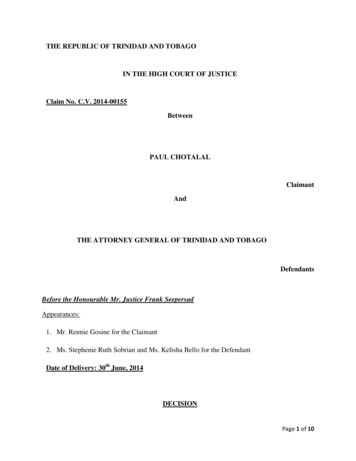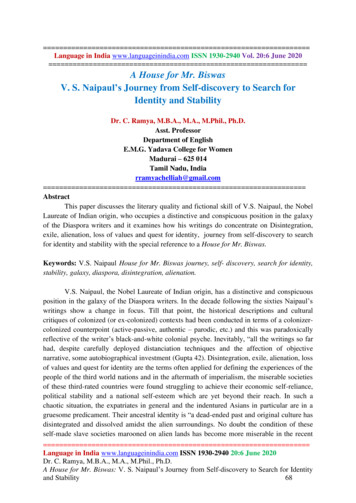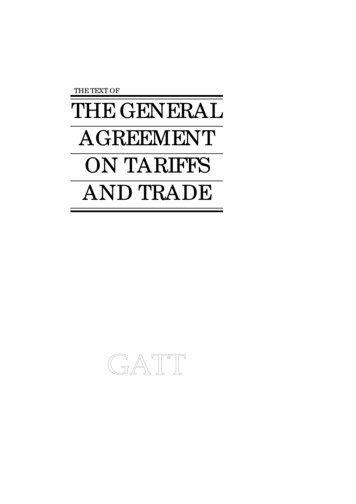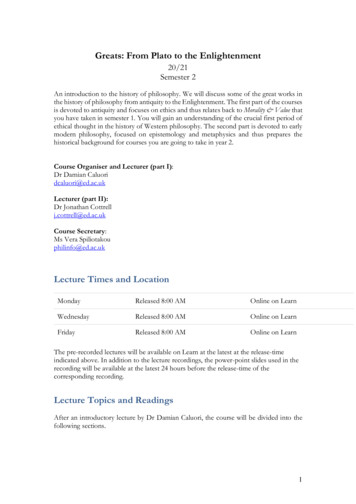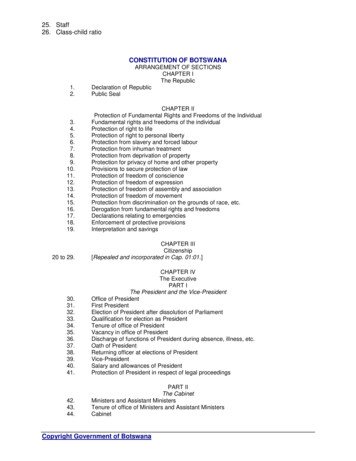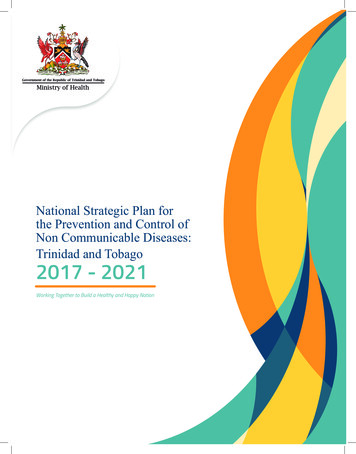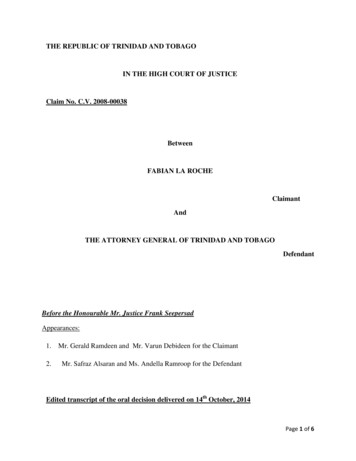
Transcription
THE REPUBLIC OF TRINIDAD AND TOBAGOIN THE HIGH COURT OF JUSTICEClaim No. C.V. 2008-00038BetweenFABIAN LA ROCHEClaimantAndTHE ATTORNEY GENERAL OF TRINIDAD AND TOBAGODefendantBefore the Honourable Mr. Justice Frank SeepersadAppearances:1. Mr. Gerald Ramdeen and Mr. Varun Debideen for the Claimant2.Mr. Safraz Alsaran and Ms. Andella Ramroop for the DefendantEdited transcript of the oral decision delivered on 14th October, 2014Page 1 of 6
REASONS1.In the case for determination before the Court, the Claimant claimed damages includingaggravated and exemplary damages for the battery and assault which he said wereoccasioned upon him on the 16th October, 2007 by officers of the emergency responseunit at a section of the Prison known as Guantanamo. The Claimant gave evidence in hisown matter and the Defendant relied on the evidence of retired Prison Officer JosephPrieto.2. The Claimant’s case, is that on the 16th October, 2007, while performing his morningprayers, 10 masked and armed Emergency Response Unit prison officers entered his celldragged him out and proceeded to inflict slaps, kicks and lashes about his body with theirstaff/batons. As a result he received bruises, swelling, pain and discomfort to his headneck back abdomen and groin areas.3. The Defendant claimed, that no assault or battery was occasioned on the Claimant onthe16th October, 2007 and according to the Defendant’s pleaded case on the said date, theERU prison officers conducted a search of the cells of few inmates to locate anyconcealed weapons and that when they attempted to search Mr. La Roche’s cell heinitially resisted and shouted obscenities and threats to them and he refused to allow themto conduct the search.4. Both witnesses were cross examined and there was no material departure in crossexamination by the Claimant from what was stated in his witness statement. However,the Court found that this witness’ demeanour left much to be desired, he delivered hisevidence with a sense of volatility and excessive emotion that did not sway the Court andhis evidence did not resonate with the Court or instill a feeling that he was a truthfulwitness. In fact the Court found that this witness delivered his evidence in a manner thatwas very convenient and he deliberately tried to engender some level of sympathy fromthe Court. On the other hand, the Court found that during cross examination Mr. Prieto’sresponses were very direct and while he departed from the pleaded case and said thatPage 2 of 6
force was used. The Court formed the view that his response as aforesaid was indicativeof the level of truthfulness and candor which the Court found to be admirable and havingconsidered his evidence concluded that he was a credible witness and the Court relied onsame.5. The Court therefore accepted and found as a fact, that Mr. Prieto could not have seenwhat transpired in the cell when the ERU Officers went into Mr. La Roche’s cell butaccepted that that incident in the cell lasted for a very short time.The Court found as afact that Officer Prieto heard the Claimant putting up some verbal opposition to beingremoved.6. The Court found as a fact, having accepted Mr. Prieto’s evidence that when the Claimantwas taken out of the cell he was not using verbal insults or obscenities against the officersand he was not resisting them. There is no evidence from Mr. Prieto that the Claimantwas behaving in a menacing or threatening manner but yet he was subjected to theunreasonable use of force by officers of the ERU who continued to beat him outside ofthe cell. The Court also found as a fact that it is only when the Claimant said that he wasa heart case that the beating that was being occasioned upon him, ceased.In thecircumstances the Court found that unreasonable and unjustifiable force was used uponthe Claimant and Defendant is therefore liable and must pay damages to the Claimant.7. The Court had to consider the appropriate quantum of damages that should be awardedand was guided by the case of Cornilliac v. St. Louis (1965) 7 W.I.R 491 and the fiveprinciples stated therein by Wooding CJ, namely:1. The nature and extent of the injuries sustained.2. The nature and gravity of the resulting physical disability.3. The pain and suffering which had to be endured.4. The loss of amenities suffered5. The extent to which, consequentially, the (claimant’s) pecuniary prospectshave been materially affected.Page 3 of 6
8. The Court found as a fact that the nature and extent of the injuries sustained by theClaimant was not extensive or substantial and there was no evidence of resulting physicaldisability. With respect to issue of pain and suffering, although the incident lasted for arelatively short period of time, undoubtedly, the Claimant would have experienced somelevel of pain and suffering. The Court was guided by the dicta of the Honourable ChiefJustice De La Bastide C.J ( as he then was)in the case of Thaddeus Bernard; AirportsAuthority of Trinidad and Tobago .v. Nixie Quashie Civ. App No. 159 of 1992 andnoted that it should when granting an award for general damages consider whetheraggravated damages is appropriate. The Court also addressed its mind to the mentalsuffering that may have been occasioned by the Claimant as well as the issue as towhether or not humiliation was occasioned to him.9. In this case there is no evidence that Mr. La Roche was intending to incite any discord ordissention on the day in question. The Claimant was in his cell when the ERU Officersentered and attempted to conduct a search. It must have been a very harrowing andfrightening experience for Mr. La Roche who was praying at the time, he was possiblybeaten in the cell and he was taken out and beaten again. In those circumstances the metalanguish and the humiliation that he would have suffered must have been considerable.The nature of the attack on Mr. La Roche however was not extensive and cannot beclassified as having been inflicted in an outrageous or sadistic manner.10. In the circumstances the appropriate award that ought to be granted to the ClaimantFabian La Roche on an account of general and aggravated damages is the sum of 30,000.00 inclusive of interest.11. The Court considered the issue as to whether or not the circumstances of this casenecessitated the imposition of exemplary damages and considered:i.Whether the Claimant cannot recover exemplary damages unless he isthe victim of punishable behaviour;Page 4 of 6
ii.The fact that the power to award exemplary damages should beexercised with restraint; andiii.The fact that the means of the parties are material in the assessment ofexemplary damages since everything which aggravates or mitigates theDefendants conduct is relevant.12. In Rookes .v. Bernard (1964) AC H29, the Court also noted that an award for exemplarydamages would be appropriate in two cases, where there is evidence of oppressive,arbitrary or unconstitutional action by servants of the government and where theDefendant’s conduct has been calculated by him to make a profit for himself , whichmight well exceed the compensation payable to the plaintiff.13. The Court also considered the local case of Owen Goring .v. The Attorney General ofTrinidad and Tobago CV 2010-03643 in which Mr. Justice Rajkumar gave an increasedaward for exemplary damages in the sum of 100,000.00 as well as the subsequentdecisions including the decision of Mr. Justice Des Vignes in the case of TommieChansun .v. The Attorney General of Trinidad and Tobago CV 2011-00224. The Courtconsidered, as well, the cases of the Frankie Bartholomew, Terrell Toney, Randy St.Rose, Leon King v The AG – CV 2009- 04755, CV 2010-00513, CV 2009 -04756, CV2009 – 04757.14. The purpose of exemplary damages is really to send a message to the functionaries of theState who have acted in an unauthorized manner. The Court found that the facts of theinstant case were fundamentally different and can be distinguished from thecircumstances that prevailed in the Goring case. In the Goring case, the assault and painand suffering occasioned on the Claimant was characterized as intense, verging onsadistic, and was one which could have resulted in permanent disability or death and thecourt gave an award of exemplary damages in the sum of 100,000.00. In the Chansuncase, the injuries sustained were less severe, and the claimant suffered soft tissue injuriesto his buttocks and outer aspects of both thighs and the Court in that case gave an awardPage 5 of 6
of exemplary damages in the sum of 20,000.00.Having regard to the Court’s findingsof fact and the Court’s view that it cannot be said the attack on the Claimant was sadisticor brutal, the officers did however overstep the parameters of their authority. The ERUOfficers ought to have dealt with the situation in a very different manner and thetreatment inflicted upon the Claimant, was unjustified. The Court is therefore of the viewthat an appropriate award for damages on an account of exemplary damages is the sum of 40,000.00.15. Accordingly the Defendant shall pay to the Claimant the sum of 70,000.00 as well ascosts calculated on a prescribed cost basis and there shall be a stay of execution of 28days. Interest shall accrue of the aforesaid sum at the statutory rate of interest untilrepayment. .FRANK SEEPERSADJUDGEPage 6 of 6
Chansun .v. The Attorney General of Trinidad and Tobago CV 2011-00224. The Court considered, as well, the cases of the Frankie Bartholomew, Terrell Toney, Randy St. Rose, Leon King v The AG - CV 2009- 04755, CV 2010-00513, CV 2009 -04756, CV 2009 - 04757. 14. The purpose of exemplary damages is really to send a message to the functionaries .


